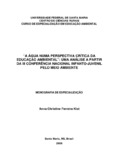| dc.contributor.advisor | Nishijima, Toshio | |
| dc.creator | Kist, Anna Christine Ferreira | |
| dc.date.accessioned | 2016-10-27T14:06:45Z | |
| dc.date.available | 2016-10-27T14:06:45Z | |
| dc.date.issued | 2009-07-15 | |
| dc.date.submitted | 2009 | |
| dc.identifier.uri | http://repositorio.ufsm.br/handle/1/2282 | |
| dc.description | Monografia (especialização) - Universidade Federal de Santa Maria, Centro de Ciências Rurais, Curso de Especialização em Educação Ambiental, RS, 2009. | por |
| dc.description.abstract | Water is a valuable natural resource not only economically but also as a fundamental
collective right for the preservation of life and sustainability of our planet. In this
paper, the Environmental Education, under a critical perspective, is understood as an
instrument of transformation of the society, providing the formation of critical people
who are able to live their citizenship in order to look after a better society living with
quality and sustainability in environmental and social justice. There are different
conceptions in Environmental Education and these present different projects of
society: a conventional conception and one which is critical, popular and searches for
emancipation. The absence of a critical, historical, political, social and cultural
analysis about the environmental problems has influence in this context. The
reductionist view of Environmental Education makes it a training education that only
teaches how to take care of the nature. The current paper aimed to analyze how this
theme is approached in the environmental education from the projects presented by
the Complete Fundamental Schools in the 3rd Infant-Juvenile National Conference
for the Environment. The specific objectives were: identify the projects on water
presented in the above mentioned conference in the area of the 8th ‘CRE’ by the
state schools located in the urban area of Santa Maria; analyze how the water theme
is approached in these projects; identify the theoretical and epistemological matrix of
Environmental Education concerned to the projects; contribute through propositions
and reflections for the development of projects in order to have an education
committed to the process of social transformation. The present research used a
qualitative method. It is concluded, at the end of this paper, that the approach used in
the projects is associated to a conventional perspective of the Environmental
Education. | eng |
| dc.language | por | por |
| dc.publisher | Universidade Federal de Santa Maria | por |
| dc.rights | Acesso Aberto | por |
| dc.subject | Água | por |
| dc.subject | Educação ambiental crítica | por |
| dc.subject | Cidadania | por |
| dc.title | A água numa perspectiva crítica da educação ambiental": uma análise a partir da III Conferência Nacional Infanto-Juvenil pelo Meio Ambiente | por |
| dc.title.alternative | "Water in a critical perspective of environmental education": an analysis from the 3rd National Infantjuvenile Conference on Environment | eng |
| dc.type | Trabalho de Conclusão de Curso de Especialização | por |
| dc.degree.local | Santa Maria, RS, Brasil. | por |
| dc.degree.specialization | Educação Ambiental | por |
| dc.description.resumo | A água é um recurso natural de valor econômico e de direito coletivo fundamental
para a preservação da vida e sustentabilidade do planeta. Neste trabalho, a
Educação Ambiental, numa perspectiva crítica, é entendida como instrumento de
transformação da sociedade, proporcionando a formação de sujeitos críticos, aptos
ao exercício da cidadania, na busca de uma sociedade melhor, com qualidade de
vida e sustentabilidade com justiça ambiental e social. Na Educação Ambiental
encontram-se diferentes concepções, que apresentam projetos diferentes de
sociedade; uma concepção convencional e outra crítica/emancipatória/popular,
influenciam neste contexto, a ausência de uma análise crítica, histórica, política,
social e cultural da problemática ambiental. A visão reducionista da Educação
Ambiental torna-a uma educação adestradora, que apenas ensina a cuidar do
ambiente. O presente trabalho de pesquisa objetivou analisar como a temática água
é abordada na educação ambiental, a partir dos projetos apresentados pelas
Escolas de Ensino Fundamental Completo na III CONFERÊNCIA NACIONAL
INFANTO-JUVENIL PELO MEIO AMBIENTE. Os objetivos específicos foram:
Identificar os projetos com a temática “água”, apresentados na III CONFERÊNCIA
NACIONAL INFANTO-JUVENIL PELO MEIO AMBIENTE, na área de abrangência
da 8ª CRE pelas escolas estaduais localizadas na área urbana do Município de
Santa Maria; analisar de que forma é abordada a temática “água” nos projetos;
identificar a matriz teórica e epistemológica da Educação Ambiental associada aos
projetos; contribuir, através de proposições e reflexões, para o desenvolvimento de
projetos na perspectiva de uma educação ambiental comprometida com o processo
de transformação social. A presente pesquisa utilizou-se do método qualitativo.
Conclui-se, ao final da realização deste trabalho, que a abordagem da temática água
nos projetos está associada a uma perspectiva convencional da educação
ambiental. | por |
| dc.publisher.unidade | Centro de Ciências Rurais | por |


